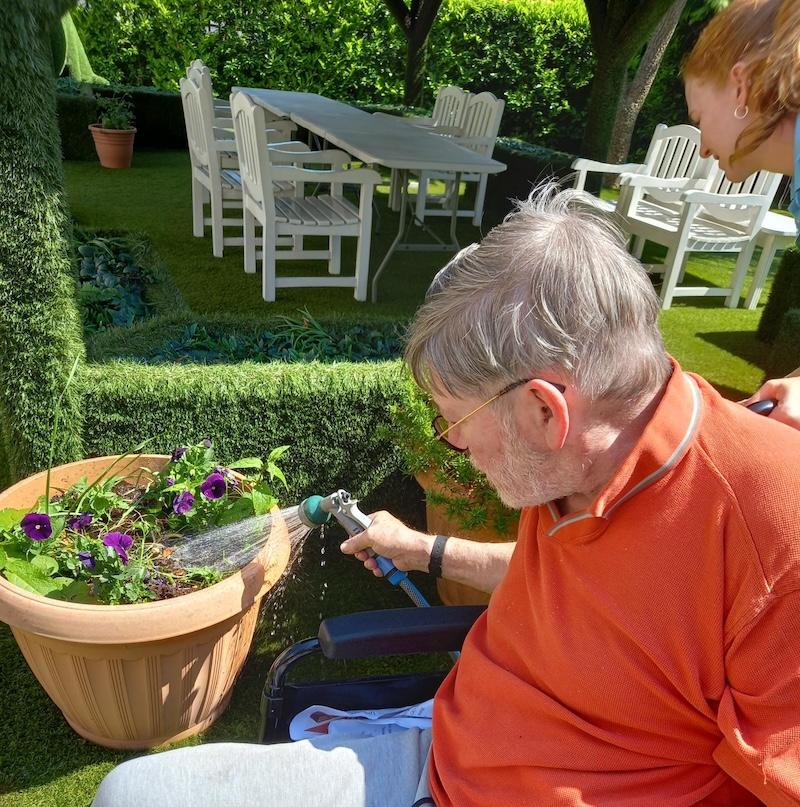What is a Residential Care Home, and What Are The Benefits?

Over time, elderly people will struggle to live independently and it will become evident that additional support is required. There are many different areas where older people can receive support, including at-home care, nursing homes or in a residential setting.
In this blog, we’ll explore the meaning of residential care, how it differs from other types of care, and the many benefits of living in a residential care home. Whether you’re starting your search online or beginning to consider care options for a family member, this guide aims to provide a clear and helpful starting point.
What is Residential Care?
Residential care is a type of long-term support provided to people who are no longer able to live independently in their own homes but don't require frequent medical attention or specialist nursing care. Residents will then receive assistance with day-to-day tasks such as washing, dressing, eating, and medication management. It is a reassuring option for older people who thrive in a group living environment or are struggling with managing their own care and household chores.
Unlike nursing care, which is suited to those living with a complex medical condition requiring frequent intervention from qualified nurses, residential care is ideal for individuals who would benefit from a more supportive and structured environment but can mostly live independently. A residential care home provides both personal care and companionship, safety, and a true sense of community.
What Does Life in a Residential Care Setting Look Like?
In a residential care home, each resident typically has their own bedroom, which they are encouraged to personalise with belongings from home. Alongside this private space, residents can enjoy communal areas where they can socialise, relax or take part in organised activities. Living in a residential care home means becoming part of a small, supportive community where care is tailored to each person’s needs.
Recently, the importance of person-centred care has become evident, and most care homes have been incorporating this into their care services. Person-centred care means building each experience around an individual’s preferences, routines and interests. From assistance with dressing and grooming to support with mobility and eating, every aspect of daily life is thoughtfully supported. Care assistants are on hand around the clock to ensure safety, provide personal care, and offer emotional reassurance when it’s needed most.

The Key Benefits of Residential Care
One of the many benefits of moving into a residential care home is the peace of mind it brings to both residents and their families. Knowing that a loved one is in a safe, welcoming environment where their care needs are met by skilled staff can significantly ease any worries.
Residential care homes also help reduce feelings of loneliness, providing social interaction and structure that can be difficult to maintain when living alone. Regular social events, shared mealtimes, and group activities offer daily opportunities for connection and stimulation, all of which play a vital role in emotional well-being.
Another advantage is the consistent and reliable care and support available throughout the day and night. With trained staff available throughout all times of the day, residents receive the support they need as soon as it’s required, whether that’s getting ready for bed or simply having someone to talk to.
A Focus on Well-Being and Enjoyment
Modern residential homes are designed not just to provide care, but also to enhance quality of life. Many offer beautifully landscaped gardens, reading rooms, and varied social programmes that keep the mind and body active. From arts and crafts to reminiscence therapy, there’s usually something on offer that appeals to a wide range of interests.
Most residential care homes also build strong connections with the local community. Common examples include visits from local schools or outings to nearby parks, zoos or shops, which bring joy, intergenerational friendships and connection to their familiar surroundings.
In homes that include a hairdressing salon or nail bar, residents can enjoy regular pamper sessions, which can give them an improved sense of purpose and confidence. Residential care aims to create a place where residents truly feel at home while having access to the support they need.

Personalised Care Plans and Support
A good residential care home will create a personalised care plan for each resident before they move in as part of their care approach. These are created in collaboration with the resident and their family and ensure that individual needs, routines and preferences are respected.
The level of care and support can also evolve as needs change, so care homes will regularly review the care plan and update this if it is needed. A lot of care homes offer multiple services and can ensure a continuum of care, which means residents always have somewhere to call home, no matter how much their needs change.
Is Residential Care Right for Everyone?
Residential care is not the right choice for everyone. For individuals who require a higher level of medical care, such as those living with a complex medical condition or who need to be seen regularly by qualified nurses, a nursing care setting would be more appropriate. However, for many older people who simply need more support than can be safely provided at home, a residential care home offers the perfect balance of independence, companionship and professional care.
Choosing the Right Residential Care Home
The decision to move into a care home requires time and compassion. It’s important to visit homes, meet the staff, and ask questions about the care provided to get an idea of where would be best for you or your loved one. Key factors to consider will be the atmosphere of the communal areas, how happy current resident are and their approach to personal care. The right care home will offer a strong sense of community alongside first-class care and be a place where residents can call home.
Another aspect that can give you an insight into the level of care provided is by looking at a home's Care Quality Commission report. A good residential care home should put the needs of its residents at the heart of everything it does.



Experience First-Class Residential Care at Silverleigh Care Home
At Silverleigh, we believe that residential care should feel like an extension of your own home and be warm, safe, and filled with people who genuinely care. What sets us apart is our commitment to truly knowing each resident and understanding what matters most to them. We take the time to build relationships, listen to personal stories, and provide care that’s shaped around individual needs and preferences.
Residential care at our care home in Axminster is about more than just support with daily routines. It’s about helping people continue to enjoy life, connect with others, and feel valued every single day. Our team works closely with residents and their families to create personalised care plans that reflect who they are, while making sure their dignity and independence remain at the heart of everything we do.
Alongside our exceptional residential care, we also provide dementia care, nursing care and short-term respite care. Our facilities are designed to offer both comfort and independence, with beautifully furnished rooms, communal dining areas and amenities such as a hair salon & treatment room, an in-house pub called The Snug Inn and a reading room.
If you’re exploring options and looking for an Axminster care home that encourages your loved ones to continue the things they love most whilst receiving the highest standards of care, we warmly invite you to get in touch and book a tour.






